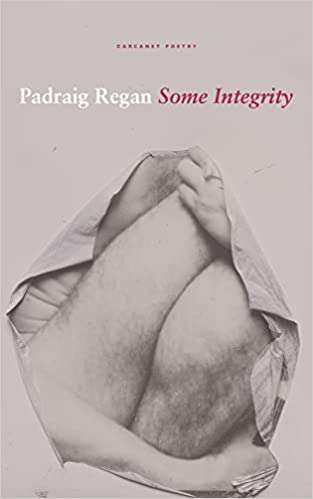Some Integrity (SHORTLISTED FOR THE FELIX DENNIS PRIZE FOR FIRST COLLECTION)
Padraig Regan
(Carcanet, 2022); pbk: £11.99
In the poem prefacing Some Integrity, Padraig Regan’s first full collection, ’50 ml of India Ink’, commissioned by Belfast School of Art, shows how integral art is to nature and to language. The collection addresses how forms change, and how lived experiences are transmuted revealing their true value and essence:
Opaque, & black as gravity,
the ink […][…] performs its tiny fractal
creep through the paper’sknitted capillaries[.]
The ‘lac-bug’ of the poem, offers the reader a punctum, a way into the ‘capillaries’ of the collection—both an offering of how this poetry is written as well as what it might be about, literally and figuratively. Poetry that offers multiple perspectives on how Regan perceives the world. Later, in the sections entitled ‘Studies’ and ‘Reproductions’, an expression, an idiom, a retained aspect of a person’s character, their shape and formation emerge—for example in ‘Minty’ with ‘its hall of mirrors. Our faces, yes, blown up & stretched grotesquely like/balloons’. Reference to glass might signal its chemical composition, or how it functions, allowing daylight to pass through into interior spaces. They might constitute ‘queer material’, writes Regan in one essay (‘Glitch City’), ‘insofar as its physicality forces us to confront the fact that the categories we receive as common knowledge—matter as solid, liquid or gas; gender as male; sexuality as gay or straight—are heuristic at best and cannot account for the true complex variety of being[…]’ For the poet, life is more nuanced, more shape-shifting than old heterodoxies and old dispensations can allow.
Arranged over five sections, Regan proffers this ‘variety of being’ in poetry and prose that focuses on food, art, sexuality. Yet as ‘categories’ they impose their own indifference to normative order, genre-typing and have built into them their own misdirection perhaps; lines of poetry often leading the reader elsewhere. ‘A Roast’ with ‘His hips/are wider than you would expect’ vacillates between this and the speaker’s charcoal study of ‘The Christ of the Foundations’; or ‘Pitcher Plants’, its single-stanza layout like a ‘wet glove for a single finger’, with the mouth as a collecting vessel, ultimately rejected by the speaker who can never be the passive recipient. Imagery always suggests more than just sex; instead, it’s more about ideas and the artistic freedom to choose how to write, what to write. How to be like the ‘lac-bug/that makes it shine’.
The exquisite prose-poetic formations of ‘Still Lifes’ fascinate me; how there can yet be a sustained movement in the stillness. The paradox of Regan’s gaze in this section falls on three ‘showreels’ of animated still lifes by fine art photographer, Ori Gersht. Photographer and poet in image and word create a perceptual bridge between what is still and what is changing, captured here in two of ‘Three Poems after Ori Gersht’:
The cloud of juice & pips it spat
the moment the bullet entered has
thinned to a few specks drifting[…](‘Pomegranate.’)
and
[…] The image
sets to rippling. It blurs like
alcohol on paint[…]
(‘On Reflection.’)
In an inspired change in mood and tempo, there is ‘Capriccio’ with its short, meditative prose essays on a range of food dishes, perceptions of glass, architecture of gaming that are resistant to the laws governing their order. In ‘Landscapes’, tesserae of memory shimmer as you glide over their surfaces:
Pink, & quivering-fresh, a two-inch strip
of salmon rests on a rice-pillow[…]
It sings against the green of what we cannot know[.](‘History.’)
Described by one poet and critic as capsular, Padraig Regan does create interesting narratives out of his own love and fascination with food and art, intensifying and personalising those experiences through layers of delicious complexity. A hot read!
William Hume


Leave a Reply